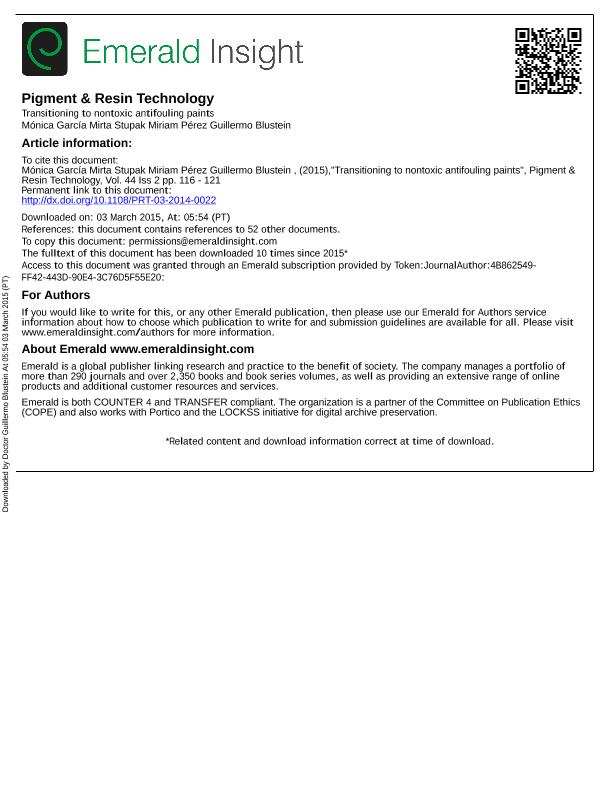Mostrar el registro sencillo del ítem
dc.contributor.author
García, Mónica
dc.contributor.author
Stupak, Mirta Elena

dc.contributor.author
Perez, Miriam Cristina

dc.contributor.author
Blustein, Guillermo

dc.date.available
2017-01-12T18:49:30Z
dc.date.issued
2015-01
dc.identifier.citation
García, Mónica; Stupak, Mirta Elena; Perez, Miriam Cristina; Blustein, Guillermo; Transitioning to nontoxic antifouling paints; Emerald Group Publishing Limited; Pigment & Resin Technology; 44; 2; 1-2015; 116-121
dc.identifier.issn
0369-9420
dc.identifier.uri
http://hdl.handle.net/11336/11226
dc.description.abstract
Purpose – The purpose of this paper is to reduce the amount of copper in antifouling paints by using eugenol as an additive. Biofouling leads to deterioration of any submerged material. The most widespread method for control is the application of cuprous oxide antifouling paints which are toxic. First of all, the paper describes the effect of eugenol on larvae of Balanus amphitrite (fouling organism) under laboratory conditions and then the preparation, application and performance of different types of antifouling paints in field trials.
Design/methodology/approach – Three types of soluble matrix antifouling paints were prepared with different pigments. The first one containing 16 per cent v/v copper, the second with 1.6 per cent copper and the third with 1.6 per cent copper 2 per cent eugenol.
Findings – After 12 months of immersion in Mar del Plata harbour paints containing 1.6 per cent copper eugenol and 16 per cent copper were the most effective. Although these formulations showed a similar performance, copper eugenol-based paint contains 90 per cent lesser copper than a traditional copper-based formulation.
Originality/value – The use of antifouling paints with copper eugenol combination as pigment is a promising alternative due to its performance, low cost and reduction in copper leaching to environment.
dc.format
application/pdf
dc.language.iso
eng
dc.publisher
Emerald Group Publishing Limited

dc.rights
info:eu-repo/semantics/openAccess
dc.rights.uri
https://creativecommons.org/licenses/by-nc-sa/2.5/ar/
dc.subject
Copper
dc.subject
Organic Compounds
dc.subject
Antifouling Paints
dc.subject
Marine Biology
dc.subject
Micro-Organisms
dc.subject.classification
Otras Ingenierías y Tecnologías

dc.subject.classification
Otras Ingenierías y Tecnologías

dc.subject.classification
INGENIERÍAS Y TECNOLOGÍAS

dc.title
Transitioning to nontoxic antifouling paints
dc.type
info:eu-repo/semantics/article
dc.type
info:ar-repo/semantics/artículo
dc.type
info:eu-repo/semantics/publishedVersion
dc.date.updated
2017-01-11T19:18:48Z
dc.journal.volume
44
dc.journal.number
2
dc.journal.pagination
116-121
dc.journal.pais
Reino Unido

dc.journal.ciudad
Bingley
dc.description.fil
Fil: García, Mónica. Consejo Nacional de Investigaciones Científicas y Técnicas. Centro Científico Tecnológico La Plata. Centro de Investigación y Desarrollo en Tecnología de Pinturas (i); Argentina
dc.description.fil
Fil: Stupak, Mirta Elena. Consejo Nacional de Investigaciones Científicas y Técnicas. Centro Científico Tecnológico la Plata. Centro de Investigación y Desarrollo En Tecnología de Pinturas (i); Argentina
dc.description.fil
Fil: Perez, Miriam Cristina. Consejo Nacional de Investigaciones Científicas y Técnicas. Centro Científico Tecnológico la Plata. Centro de Investigación y Desarrollo En Tecnología de Pinturas (i); Argentina. Universidad Nacional de la Plata; Argentina
dc.description.fil
Fil: Blustein, Guillermo. Consejo Nacional de Investigaciones Científicas y Técnicas. Centro Científico Tecnológico la Plata. Centro de Investigación y Desarrollo En Tecnología de Pinturas (i); Argentina. Universidad Nacional de la Plata; Argentina
dc.journal.title
Pigment & Resin Technology

dc.relation.alternativeid
info:eu-repo/semantics/altIdentifier/doi/http://dx.doi.org/10.1108/PRT-03-2014-0022
dc.relation.alternativeid
info:eu-repo/semantics/altIdentifier/url/http://www.emeraldinsight.com/doi/abs/10.1108/PRT-03-2014-0022
Archivos asociados
